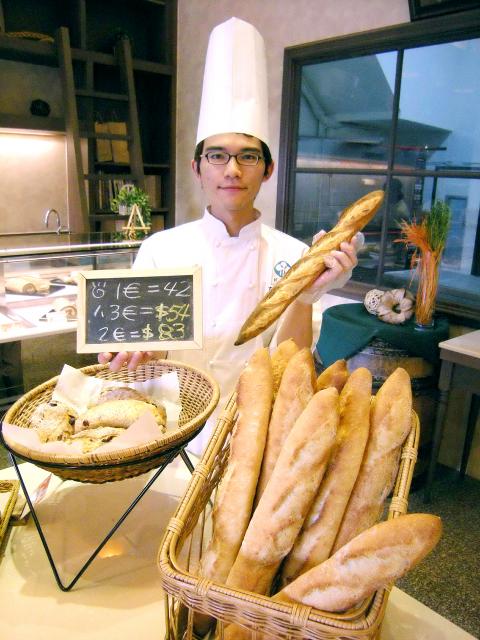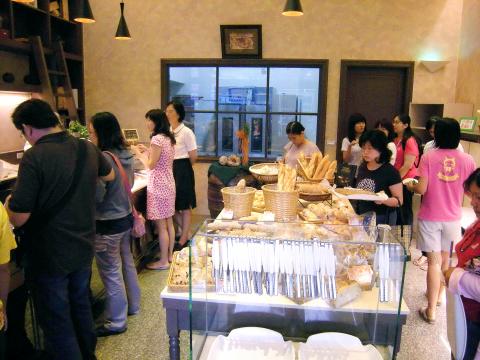A young baker in Kaohsiung last month opened a bakery that links its bread prices to the euro, meaning that prices change from day to day accor-ding to the fluctuations of the euro.
The bakery’s owner is Wu Tzu-ching, a 24-year-old apprentice of 2010 Masters de la Boulangerie winner Wu Pao-chun. The younger Wu and his associate Wang Peng-chieh opened the Boulangerie Shakespeare on Sept. 8 on Kaohsiung’s Kuanghua Road. The store sells around 30 baguettes per day at about 1.5 euros, which equates to about NT$54. The price changes from day to day and is quoted according to the value of the euro listed at the neighboring branch of the Taiwan Cooperative Bank.
Wu said that the French government mandates that the price of a baguette mustn’t exceed two euros, and government officials inspect bakeries so the rule is closely observed. After returning to Taiwan he decided to follow the same policy and sell bread in Kaohsiung at the same price as in Paris.

PHOTO: HUANG HSU-LEI
照片:自由時報記者黃旭磊
In 2007 Wu represented Taiwan at an international bakery competition in Shizuoka, Japan. After receiving tutelage from Wu Pao-chun, he managed to see off competition from a Japanese entrant to claim second prize behind the French contingent. Wu has visited Paris three times, where he found a bookstore called Librairie Shakespeare on the banks of the Seine. The store’s relaxing atmosphere inspired him to use its name for his own bakery.
Wu and Wang borrowed over NT$5 million to set up the bakery and they often worry about being able to make the repayments, but he feels much better at 6pm when customers line up along Kuanghua Road to buy their freshly baked bread.
(LIBERTY TIMES, TRANSLATED BY TAIJING WU)

PHOTO: HUANG HSU-LEI
照片:自由時報記者黃旭磊
高雄市一位年輕麵包師傅上個月開了一家以歐元計價的麵包店,因此香噴噴的麵包每天價格不一,會隨著歐元的匯率而波動。
世界麵包比賽冠軍吳寶春的二十四歲徒弟武子靖,及合夥人王鵬傑,九月八日於高雄市光華路開設莎士比亞烘焙坊。店中法國麵包每天熱賣三十幾條,採歐元計價,約一點五歐元,折合台幣約五十四元,價格每天不同,且匯率依照隔壁合作金庫牌價變動。
武子靖說,法國政府規定條狀麵包不能超過二歐元,官員常上街頭查價,因此店家都守規矩。回國後他決定與當地同步政策,參考巴黎的麵包價在高雄販賣。
武子靖二零零七年代表台灣到日本靜岡參加國際技能競賽,出國前接受吳寶春指導,擊敗日本對手獲得第二,僅次於法國隊。他曾三度到巴黎,喜歡塞納河旁「莎士比亞書店」典雅休閒氣氛,故以此命名自己的麵包店。
新店貸款五百多萬元,他與合夥人王鵬傑擔心還不清。但是晚上六點蜂巢麵包出爐,人潮常排到光華路旁,他說,營業額「放心多了」。
(自由時報記者黃旭磊)

The Dutch introduced the Indian mango (Mangifera indica) to Taiwan in the 17th century. It is a green-skinned mango with thick fibers that get stuck in the teeth, but it boasts a rich aroma and a unique taste. In 1954, Taiwan’s Council of Agriculture introduced several mango cultivars from Florida, USA, including the Irwin, Haden, and Keitt varieties. After seven years of testing and domestication, the Irwin variety was chosen for promotion. Years later, the sample saplings started to bear fruit. These mangoes were large, with thin, vibrant red peels and golden pulp. The Irwin mangoes were mouth-wateringly sweet and

As the priest Antonius Hambroek stood in the dim chamber of Fort Zeelandia, his eldest daughter clung to him, her voice trembling. “Father, don’t go. They’ll kill you, and what will become of Mother and my sisters?” Outside, the sounds of Koxinga’s relentless canon siege boomed through the fortress. The defenders were on the brink of collapse. Starvation gnawed at their resolve, and the air carried the acrid stench of spent gunpowder and rotting flesh. Dutch reinforcements from Batavia had failed to arrive, leaving the garrison isolated and hopeless. Hambroek’s face was calm, though sorrow weighed heavily on his

對話 Dialogue 清清:今天中午我要多吃一點,不然晚上可能會吃不飽。 Qīngqing: Jīntiān zhōngwǔ wǒ yào duō chī yìdiǎn, bùrán wǎnshàng kěnéng huì chībùbǎo. 華華:怎麼了?為什麼會吃不飽? Huáhua: Zěnmele? Wèishénme huì chībùbǎo? 清清:今天大年初七,是「人日節」,傳統上結了婚的女兒要回家給父母送長壽麵,而且最好是素的,我姐姐會回來,只吃素麵,我應該很快就餓了。 Qīngqing: Jīntiān Dànián chūqī, shì “Rénrì jié,” chuántǒng shàng jiéle hūn de nǚ’ér yào huíjiā gěi fùmǔ sòng chángshòumiàn, érqiě zuìhǎo shì sù de, wǒ jiějie huì huílái, zhǐ chī sùmiàn, wǒ yīnggāi hěn kuài jiù èle. 華華:我還是第一次聽說有「人日節」呢!這是怎麼來的啊? Huáhua: Wǒ háishì dì yī cì tīngshuō yǒu “Rénrì jié” ne! Zhè shì zěnme lái de a? 清清:老一輩的人說,女媧是在第七天造出了「人」,所以今天可說是我們每個人的「生日」呢!生日快樂! Qīngqing: Lǎoyíbèi de rén shuō, Nǚwā shì zài dì qī tiān zào chūle “rén,” suǒyǐ jīntiān kěshuōshì wǒmen měi ge rén de “shēngrì” ne! Shēngrì kuàilè! 華華:你也是啊!欸?那前六天女媧都做了什麼呢? Huáhua: Nǐ yěshì a! Éi? Nà

As we bundle up in thick coats to stay warm during the winter, there is a population that has already adapted to extremely low temperatures. These people live in the remote city of Yakutsk, the coldest city on Earth. Yakutsk is situated in the heart of Siberia, which is the capital of the Sakha Republic in Russia. This historic mining city began to flourish in the 19th century following the discovery of gold deposits. Given its construction on permafrost, the average temperature in the city remains below 0°C for over half the year, with winter temperatures dropping to an astonishing -50°C.